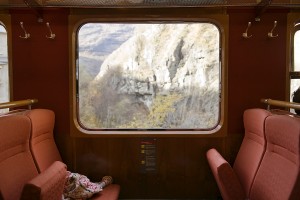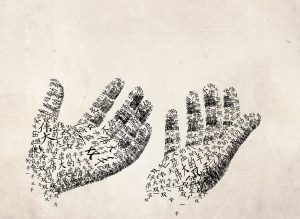
ISIS Lit: Saudade
by Miriam Gordis | July 20, 2014
One summer before the end of the world, Clement’s mother packed up her bags and took him away from the house where he had grown up. He was sorry to leave that city on the whitewashed California coast, the blue fog that pooled on the horizon, the lace curtains of his grandmother’s house and the sandcastle toys she kept in the back closet. He wanted to bring his mould but his mother said he wouldn’t need it – they weren’t going to the beach and there wasn’t room in his backpack.
The backpack had planets on it. His grandmother had bought it at the dollar store for one crumpled American bill from the box under her bed. She wanted him to understand the solar system, she said, to understand that they were tiny, inconsequential beings in a vast chasm of space and fiery gas. She set up the Milky Way in the living room and watched him move the stars around, here and there, while The View played on the television. His mother sat on the back porch and smoked and watched the ocean.
She was tall and brown and she had a mournful mouth like Salvador Dalí. She told him he had washed up one day on the beach, where the surf turned green on the sand, wrapped in an Indian blanket. She had shaded her eyes with her hand and squinted into the sun, but as far as she could see, there was only sea and sky and no one else to claim him. So she wrapped him up and took him home with her.
They hitchhiked south. The first driver was a commuter, who talked about serial killers the whole way. When he let them off, he suggested they turn around. The world wasn’t safe for a woman without a mission and her gypsy baby. The second driver was a Steinbeck pilgrim, bound for Monterey. He shared a joint with Clement’s mother and dropped them in the dusty center of California, a hundred and fifty miles from the coast. Clement’s mother bought Clement a milkshake and then decided to take a bus.
Later, the house by the sea would become a grainy snapshot behind his eyes. He knew the address but it might as well have been gone forever, the way that your parents are gone forever if you lose track of them in the supermarket. Once his mother called his grandmother from a payphone in Los Angeles but the quarters ran out before he got a chance to speak. He had wanted to tell her that he had seen a mammoth on Wilshire Boulevard.
In the Miracle Mile, Clement’s mother became a bird woman. She sat in the shadow of the art museum and fed the pigeons bits of hotdog buns and chips that people dropped and scraps of holy poetry all day long. “We all have gifts,” she told Clement one evening. “We just have to not be afraid of where they take us.”
She gave out advice liberally and most of it sounded like a new age Hallmark card. That was how she met the Marquis, late one afternoon, when the orange light circled around her feet and left her face dark. He had just come out of an exhibit about Astro Boy and he was eating a package of rice cakes so absently that he didn’t notice where he was going. When he walked into Clement’s mother, she helped him up graciously and swept the spilt rice cakes into a pile for the pigeons.
“You can’t always look where you’re going,” she said soothingly. “How else could you stumble into your future?”
The Marquis was so impressed by her fortune cookie platitudes and her saffron perfume that he invited her to dinner. He even bought Clement an enormous sundae. Clement understood the implied barter and was disgusted. He picked at it until it melted in the glowing Los Angeles night and the slushy syrup ran down the sides of the glass.
The Marquis wanted to be a leading man. He was tall and stringy and he played the ukulele. He wore rings on his thumbs and he was making a slam poetry project with black and white slides. On sunny days, he put grease in his hair and went off to look for venues for his slam poetry and his bluesy, throaty soul music. He taught Clement to play the ukulele and then taught him the chords for Back in the USSR because kids these days didn’t know anything about history. The Marquis believed that anime and Marxism and cotton candy were going to save the world or maybe there would be an apocalypse and then nothing would matter, anyway. We’re not getting any younger, said Clement’s mother, but the Marquis still bought cans of peas and beans whenever he went to the grocery store.
Los Angeles was a strange and alien beast to Clement. At 13, he stole a bike because it was orange and the lock was broken and he was bored out of his mind. His mother was furious but the Marquis sat him down and talked for hours about the principles of stealing from the rich. He got animated and paced around, waving his hands, his words coming faster and faster. Clement curled up on the couch and tried to sleep through it. He didn’t even really want the orange bike. He wanted the city to fold back onto itself like a popup book, all the high rises and the sprawling villas and the purple hills flattening until the horizon stretched out endlessly.
There must have been girls at some point. There is lost love in everyone’s past or at least, the possibility of lost love: evenings that smell like wisteria and beer and your reflection flashing by in someone else’s sunglasses, eyes that hold yours too long on the street and the larger-than-life bubblegum lips on a billboard, promising a whole different world.
“You were born with old eyes,” his mother told him one vacation. She was on a quest for karma. She had a guidebook for soul seekers and she referred to it at every road sign as they descended into the Mojave Desert. It was outdated, which irritated the Marquis, and the directions were not very accurate. But the desert was all color, a clash of gold on the burnished blue of the sky, and flowers growing out of nowhere. When they stopped, the air was so hot that Clement thought breath would crystalize in it, into steam or the rank odour of memory.
“I was afraid when you were born, because I didn’t know how to take care of you. But then I saw your eyes and I knew you were an old soul and I would never have to worry about you. There’s a Portuguese word for that kind of memory, missing something you had, maybe in a former life, maybe something you never really had. There’s no English word for it, even though it’s what life is all about: a moment of suffering that you miss before it’s even over.”
She had become spiritual. She exuded radiance like a light in her face. Her platitudes had become suddenly rich, imbued with metaphors and allusions and tremendous longing. Clement did not understand it and it made him uneasy because he sensed correctly that he was losing her. In the yellow interior of their kitchen, she grew slowly into herself. She lit candles everywhere, complaining that it was too dark and then left them burning, filling the house with the smell of smoke. Up and around her it grew, like the protective globe of a light bulb, clasping her feet narrowly and opening into a dome up around her head. It was tough and springy to the touch like a thick sheet of transparent rubber. Clement thought if you cut it, she would have bled.
So he packed up and left, wandering the way he had as a child, sleeping in the sweat of strangers and living on their charity. In the lowlands of Louisiana, he found work in a sleepy bar, where fireflies buzzed on the porch and frogs croaked a few blocks away. He served beer in a trance for nearly six months, breathing Cajun music until he knew all their songs. They were about death, about love betrayed and abandoned, and they were all songs you had to dance to. That’s the blues, the fiddler told him. We’re clinging on for life here, we’ve got to dance. Haven’t you ever loved anything? You love something because you know it’s going to leave you.
He thought he might have fallen in love with New Orleans, uncomprehending and star-struck, when a storm blew up from the Gulf and deluged the city with water. In the weeks that followed, he sat in the high and dry of the French Quarter, while the city drowned and floundered and he thought this must be the end of the world.




